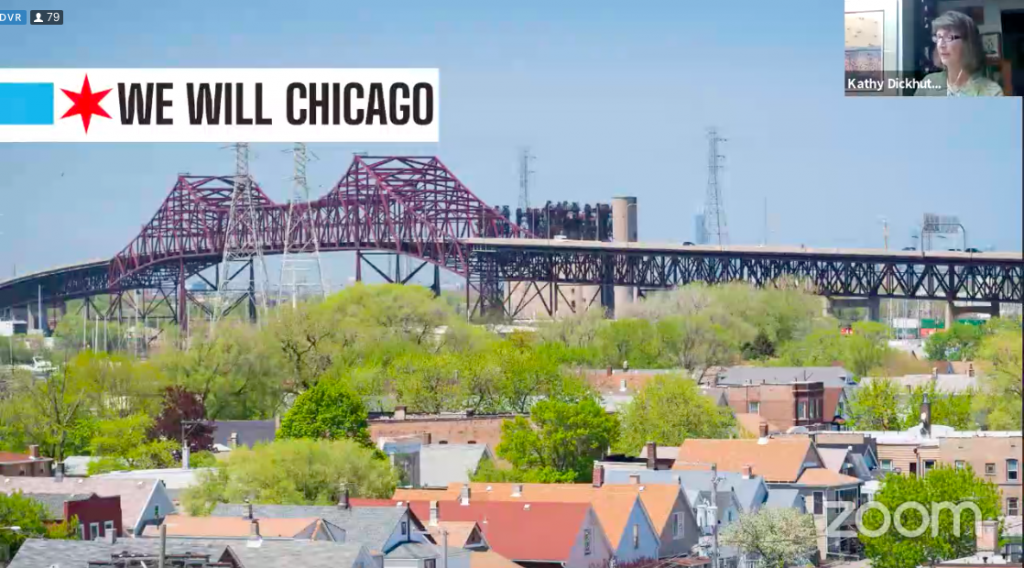-
Multi-year ‘We Will’ plan could draw roadmap to future desegregation, officials say

Chicago Deputy Planning Commissioner Kathy Dickhut gives a presentation on the “We Will Chicago” plan during a meeting of the Chicago Plan Commission.
Chicago city planners of the mid-20th Century hardened lines of racial segregation by dividing neighborhoods with expressways and demolishing others under the guise of “slum clearing.” Now city officials are hoping a new plan can undo the damage.
Leaders of the city’s Department of Planning and Development on Thursday pinned high hopes on the “We Will Chicago” plan, a master document intended to “guide future budgeting, policy, and development decisions citywide” for decades to come. Once adopted in late 2022, they said it could unite a fractious city toward a more just future.For now, however, the plan is a mostly blank canvas. A presentation made during a meeting of the Chicago Plan Commission showed that the underlying principles of “equity, diversity, and resiliency” will guide the plan. But the department has yet to come up with a list of topics the plan will address, or even finalize the coalition of groups that will be a part of drawing them up, deputy planning Comm. Eleanor Gorski told members of the commission.
“This is really the beginning, and we want everyone’s participation in it, “Gorski said. “We want every single person in the city to see that this is their plan, and that they have a say in it.”
While city planners and community groups have developed dozens of plans for specific neighborhoods over the past several decades, Chicago has not published a cohesive citywide plan since the 1984 Chicago Works Together Development Plan. The last citywide plan published before that was the 1966 Comprehensive Plan of Chicago, which was developed with an eye toward keeping white Chicagoans from fleeing the city, Deputy Planning Comm. Kathy Dickhut said.
Planning department Comm. Maurice Cox said the plan would give city leaders an opportunity to undo its decades-long legacy of “gross inequities that we are dealing with every single day.”
“If we do our work well, we won't be looking 50 years from now and asking the question we ask from 1966 to today: how did the city become so segregated?” Cox said. “We are called to make progress on trying to create a more equitable city, but we are hamstrung by the rules and policies we have inherited. So it is time to have a citywide conversation.”
The department tasked the Chicago Metropolitan Agency for Planning (CMAP) to create a framework for working on the plan next month that will involve local civic organizations and "subject matter experts,” CMAP deputy director Stephane Phifer said during the meeting.
The nonprofit Metropolitan Planning Council will also hold a series of virtual public workshops this fall to gather public input on the plan.
The planning department aims to unveil a draft plan by the end of next year so that it can be adopted by the City Council in late 2022 and incorporated into the following year’s budget.
Cox said it would be important for the council to codify the plan — unlike the 1966 and 1984 plans, which were never formally approved — “so that the community will be armed with a consensus that this is the direction we want to go.”
The department may have difficulty selling such a plan to aldermen, many of whom have their own planning philosophies and have resisted initiatives originating from downtown. City planning officials under Mayor Lori Lightfoot have spent months working on some initiatives, like the designation of a Pilsen historic landmark district and the legalization of accessory dwelling units, only to have them run into resistance on the council floor.
According to the department’s timeline, aldermen will be asked to vote on the plan several months before the 2023 city elections.
However, Ald. Walter Burnett (27), a member of the Plan Commission who is typically protective of each alderman’s control over development in their own ward, spoke warmly of the plan on Thursday. He said a citywide approach would help people “understand how what affects one of us affects all of us” — especially in the wake of the widespread looting of downtown that occurred earlier this month.
“With all the marching and the looting going on, there's a disconnect on understanding how we're all in this together,” Burnett said. “When downtown don't make money, there's less money going to other parts of the community.”
River West apartments approved
Commissioners on Thursday also approved a proposal (O2019-9350) by Bond Companies to build an eight-story, 113-unit apartment building at 1140 W. Erie St. in the 27th Ward.
Because the development is proposed inside the city’s Near North Affordable Requirements Ordinance pilot zone, Bond is required to charge affordable rents on at least 20 percent of the units it builds. The developer plans to rent 23 apartments at reduced rates, but 17 of them will be located in separate buildings the developer plans to rehab in the Humboldt Park and Garfield Park neighborhood.
An attorney representing the developer said the off-site plan would allow the construction of more “family-sized” affordable units, including seven 2-bedroom and six 3-bedroom apartments.
The affordability “pilot zone” is set to expire at the end of this year, ending a three-year run following the last update to the Affordable Requirements Ordinance in 2017. The Chicago Department of Housing plans to introduce an updated ordinance this fall.
The commission also approved all other items included in The Daily Line’s preview of the meeting, including a new community center and job training center in North Lawndale and minor amendments to two previously-approved developments in Old Town.
Do you like this page?













